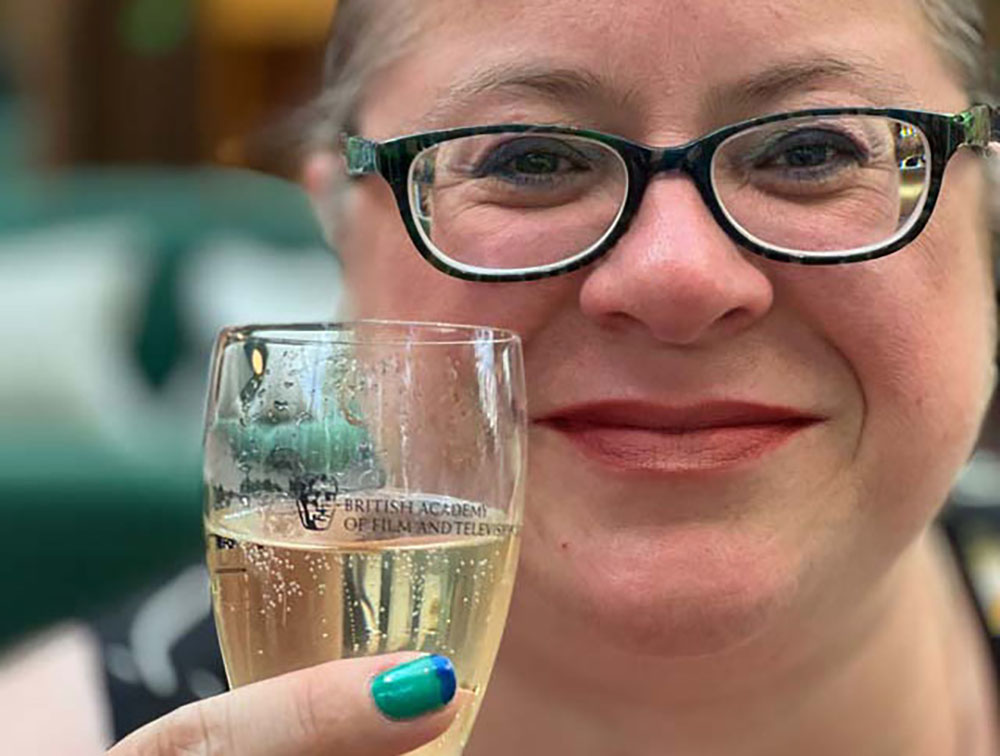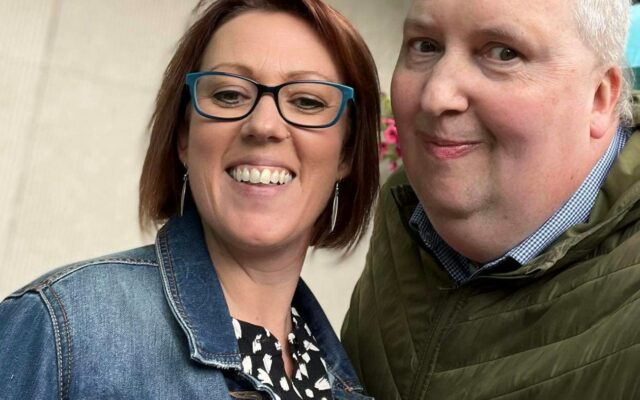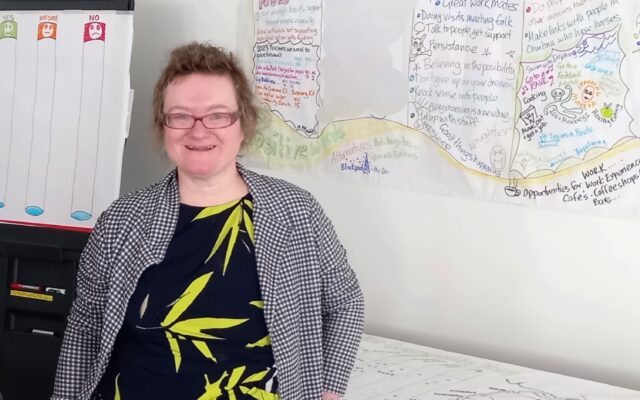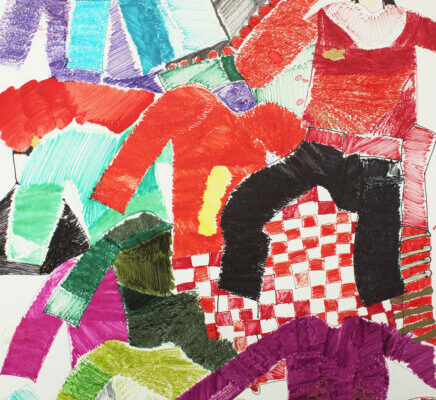“It was the best job I have ever had,” says Claire-May Minett. “Everyone was so kind and considerate, helping me, supporting me. I couldn’t believe it.”
Minett is describing her work as a paid trainee filmmaker behind the scenes for the 2022 BBC series Ralph and Katie, about a couple with Down syndrome.
Minett, aged 44, has mosaic Down syndrome, which is not a visible disability. She says: “People don’t realise until they have met me a couple of times that I actually am kind of impaired in some way, and then they will try to bully me or tease me. I have had this most of my life.”
On a previous job, for example, she had to do things in a certain, fixed way, even though her own way worked better for her. She adds: “I got told off for treating a bigwig manager like everyone else.”
But that did not happen when she worked alongside Ralph and Katie producer Jules Hussey, making a series of online behind-the-scenes shorts to accompany the show.
It was the first TV job in over 10 years where Minett has not experienced discrimination. She was so pleased that she created her own award for the team, buying a small trophy and getting it inscribed.
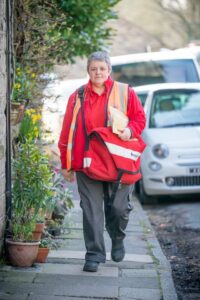
This inclusion is the exception rather than the rule, which speaks volumes for Minett’s indomitable spirit in pursuing a career in the industry.
Disability and learning disability have featured in films, most recently in An Irish Goodbye, which won both an Oscar and a Bafta. However, a recent report by non-profit group Creative Diversity Network estimates it will take almost two decades for disabled people to be properly represented in the sector.
While 17% of the UK workforce is disabled, in TV only 4.5% of those behind the camera and 6.8% in front of it have a disability.
Ralph and Katie broke new ground in British TV by having two lead actors with Down syndrome; perhaps even more remarkably, many more people with disabilities were involved behind the camera.
All the script writers had disabilities and Hussey says the crew included people with learning disabilities, autism and mental health issues, plus a person with a physical disability and someone who was deaf.
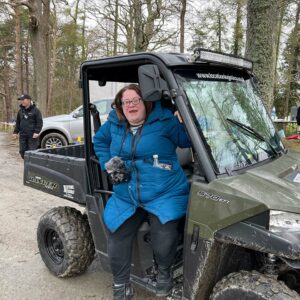
Director Jordan Hogg has cerebral palsy, although Hussey laughs “actually his real disability is voting Tory”. It is clear they are friends.
Hussey was employed on Ralph and Katie but says the inclusive approach comes from her own company, Brazen Productions. It is also rooted in her experience as a life-long advocate for her 56-year-old brother Martin, who has learning disabilities and autism.
We’re all different
“The ethos of my company is very much taking the approach that everybody is different. It’s not about saying ‘this is a disabled project’. It is saying ‘we will ask everybody how we can support them to do the best possible job’. And that is people who identify as disabled and people who don’t, and people who have caring responsibilities.”
One thing that made a difference on Ralph and Katie was a free phone app, Call it!, which Hussey helped create. The app, launched in 2021, sends anonymous feedback to employers about how employees feel they have been treated.
Minett says: “You can touch the green one if it’s been a happy day or the red one for not being happy, for example if someone’s said something that hurt you.”
Hussey feels the app is a sign of how things are changing and TV and film employers are starting to realise they are accountable.
The production used easy-read call sheets, which outline the filming schedule, for the actors and crew. Hussey also introduced fun things to help break down barriers and “reset relationships” after long days working together on the same sets.
There was a lot of dancing involving the cast and crew, a magician who came in to teach tricks, and a petting zoo – which included a snake.
Occasionally, some crew members became frustrated about the extra time needed for some of the activities and adjustments. This was solved by Hussey explaining the positive impact in that it made all team members feel more included.
People always fear inclusion will cost more, she says. “And that’s not the case. You just need to move the money about.”
For example, everyone wore name badges, which improved accessibility at a low cost. Hussey says adaptations should be made in all productions, not be stuck in a disability silo,“because everybody benefits from a reasonable adjustment”.
What are Minett and Hussey proudest of in their work?
Minett says: “The fact that I can now be freelance and work on many different productions with a bit more understanding.”
Hussey says her pride comes from “being considered an ally by disabled people, being trusted”.
She adds: “I am proud of the fact that organisations like these absolutely consider me on their side. Not stepping in front of them and leading the way but walking side by side. They acknowledge my different lived experience and the fact that I am not trying to be their saviour.”
She has worked alongside disability-led organisations such as Triple C (which helps deaf, disabled and neurodivergent people access the arts and media), Manchester’s Disabled Artists Network and the Deaf and Disabled People in TV forum.
Hussey is keen that people with disabilities are shown as being ordinary: “I get quite annoyed by representations of autism where everybody has got a special skill and it’s all marvellous. It’s just so unrealistic.”
Sometimes people ask about her brother’s special skill. She laughs: “I say ‘masturbating’ – just to shut people up. Because everyone thinks there is a special skill.”
Is having an autistic brother the spark for her commitment to inclusion for disabled people? “It didn’t spark it because it just, to me, seems bloody obvious.”
She tells me about her 54 years of experience advocating for a severely learning disabled man who needs one-to-one support.
“Things were very different when he was young. There was little knowledge of autism. I wasn’t allowed to be involved in school activities because of my brother. I know we have so many problems with disability and equality but, my God, we have come a long way from the 1970s.
“I haven’t stopped and gone ‘I’d be really good at inclusion because of Martin’. It’s just how I am. It’s more the case that I think: well, why are people not doing this?
It’s so easy.”
As for the future, Minett says she would love to do more behind-the-scenes films. Hussey has news: the BBC is to support Brazen through its Small Indie Fund, meaning extra money plus mentoring and support to, as Hussey says with optimism, “get disabled people’s voices into the mix”.
Images: Ben Blackall (Jules Hussey as a postwoman) and Jules Hussey (all other images).


